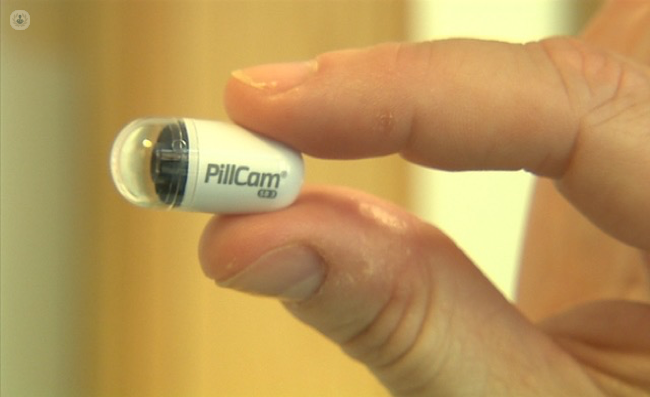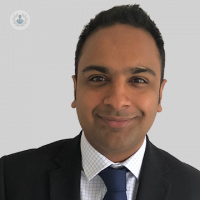Video capsule endoscopy: special considerations
Written in association with:Video capsule endoscopy is used to visually examine the lining of the small intestine. It’s a noninvasive procedure where a tiny camera within the capsule is used to view the entire length of the small intestine.

It is extremely rare that a patient is unable to swallow the capsule, but where this is the case the test can still be undertaken. Another concern is about if the capsule can get stuck within the bowel. We ask leading consultant gastroenterologist, Dr Amit Chattree, about what can be done when these concerns are present.
What if I have problems swallowing the capsule?
The capsule is small and very easy to swallow. In very rare cases where the capsule cannot be swallowed, it can be easily introduced directly into the small bowel with an endoscope. Swallowing difficulties do not prevent capsule endoscopy from taking place. Patients will undergo detailed questioning before the test to ensure that anyone at risk of swallowing difficulties is identified and the appropriate method for capsule insertion is used.

Can the capsule get stuck inside the bowel?
The videocapsule is extremely small and the risk of it getting stuck is very low indeed (generally under 1% even without any special precautions). However, as with assessing for any swallowing difficulties, patients will undergo detailed pre-test questions to identify any potential risk factors for the capsule getting stuck, such as severe abdominal pain or suspected small bowel narrowing. In any case where there is even the slightest concern about the capsule getting stuck (a retained capsule) a special dummy pill called a patency capsule can be used first to reduce the risk of a retained capsule even further.
This is a test capsule that is the same size as the videocapsule that can be detected with a special metal scanner or detected on an x-ray. The patency capsule is made from a dissolvable gel that dissolves after a short period of time if stuck in the gastrointestinal tract. If the patency capsule is not detected following being swallowed, this confirms that it is safe to proceed to the video capsule test. If the patency capsule is detected, its location can be easily identified and this is often very important in detecting the underlying health problem. I offer the patency capsule in addition to video capsule endoscopy to suitable patients.
Read more about having a patency capsule here.
How long does the test take?
The test takes about 8 hours and during this time you are able do most things as normal. After 8 hours the sensor belt and video monitor device can be removed. The capsule itself will pass out naturally when going to the toilet and does not need to be retrieved.
Are any activities or food and drink prohibited during the test?
We ask that you refrain from food for at least 6 hours before the test and fluids for at least 2 hours before. You will be able to drink fluids almost straight away after (15-30 minutes) and eat food about 4 hours after swallowing the capsule. As such it is easy for patients with conditions such as diabetes to undergo the test without significant disruption.
When the test is over, how do I find out the results?
The video monitor device records the passage of the video capsule and this video is downloaded as soon as the device is returned. As soon as the video is downloaded, I am able to review it and will contact you soon after to discuss the results. This is typically within 24 hours.
For more information about this procedure, you may like to book an appointment with a leading gastroenterologist such as Dr Amit Chattree. Visit his Top Doctors profile today to find out about appointment availability.


